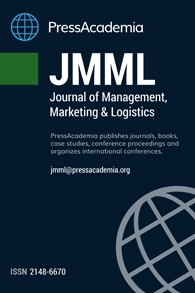A STUDY TOWARDS UNDERSTANDING PERCEPTION OF ENVIRONMENTAL SUSTAINABILITY IN TURKISH AVIATION INDUSTRY
A STUDY TOWARDS UNDERSTANDING PERCEPTION OF ENVIRONMENTAL SUSTAINABILITY IN TURKISH AVIATION INDUSTRY
Sustainability, green management social responsibility, environment, aviation,
___
- Altman, R. L. (2009). Aviation alternative fuels developpment and deployment. Critical Issues in Aviation and the Environment, 11-17.
- Basiago, A. D. (1998). Economic, social, and environmental sustainability in development theory and urban planning practice. Environmentalist, 19(2), 145-161.
- Davis, R. S., Ternieden, C. H. (2009). Water quality. Critical Issues in Aviation and the Environment, 24-27.
- De Burgos J, J., Céspedes L., J. J. (2001). Environmental performance as an operations objective. International Journal of Operations & Production Management, 21(12), 1553-1572.
- Eagan, M. E., Bell Dç, O. (2009). Introduction. Critical Issues in Aviation and the Environment, 1-3.
- Eagan, M. E., Raguel, G., Lourdes, M. (2009). Noise, Critical Issues in Aviation and the Environment, 4-10.
- Emas, R. (2015). The concept of sustainable development: definition and defining principles. Brief for GSDR 2015, Florida International University.
- Environmental Protection Agency (EPA) (2006). Lean and environment training module 2 – lean and environment toolkit. Environmental Protection Agency, Washington, DC. https://www.epa.gov/sites/production/files/2015-06/documents/module_2_envwastes.pdf, Erişim Tarihi: 12.03.2018.
- Forsyth, P. (2011). Environmental and financial sustainability of air transport: are they incompatible?. Journal of Air Transport Management, 17(1), 27-32. https://doi.org/10.1016/j.jairtraman.2010.10.006
- Galpin, T., Whitttington, J. L., Bell, G. (2015). Is your sustainability strategy sustainable? Creating a culture of sustainability. Corporate Governance, 15(1), 1-17.
- GRI Global Reporting Initiative (2000 - 2011) Sustainability reporting guidelines. https://www.globalreporting.org/resourcelibrary/G3.1-Guidelines-Incl-Technical-Protocol.pdf, Erişim Tarih: 18.06.2017.
- Gupta, M., Brain K., John, P., Mary, L. V. (2009). Air quality. Critical Issues in Aviation and the Environment, 11-17.
- Haden, S. S. P., Oyler, J. D., Humphreys, J. H. (2009). Historical, practical, and theoretical perspectives on green management: an exploratory analysis. Management Decision, 47(7), 1041-1055.
- Aigner, J. D., Lloret, A. (2013). Sustainability and competitiveness in Mexico. Management Research Review, 36(12), 1252-1271.
- Khan, M. A. (1995). Sustainable development: the key concepts, issues and implications. Keynote paper given at the international sustainable development research conference, 27–29 march 1995, Manchester, UK. Sustainable Development, 3(2), 63-69.
- Kautto, P. (2006). New instruments – old practices? The implications of environmental management systems and extended producer responsibility for design for the environment. Business Strategy and the Environment, Vol. 15 No. 6, pp. 377-388.
- Klin T. P., Putnam, E. E. J. E., Stewart, B., Vigilante, M. L. (2009). Airport, nonaircraft emissions and climate change. Critical Issues in Aviation and the Environment, 18-23.
- Korul, V. (2003). Havaalanı çevre yönetim sistemi. Anadolu Üniversitesi, Sosyal Bilimler Dergisi, 3(1), 99-120.
- Koshuta, C., Lurie, C., Stewart, B. (2009). Sustainability. Critical Issues in Aviation and the Environment, 37-40.
- Lee, H., Jai, T. M., Li, X. (2016). Guests’ perceptions of green hotel practices and management responses on TripAdvisor. Journal of Hospitality and Tourism Technology, 7(2), 182-199.
- Lee, K. H. (2009). Why and how to adopt green management into business organizations? The case study of Korean SMEs in manufacturing industry. Management Decision, 47(7), 1101-1121.
- Orlitzky, M., Swanson, D. (2008). Toward integrative corporate citizenship: research advances in corporate social performance. Springer.
- Rodrigue, J. P., Slack, B., Comtois, C. (2008). Green logistics. In Handbook of Logistics and Supply-Chain Management (pp. 339-350). Emerald Group Publishing Limited.
- Tıraş, H. H. (2012). Sürdürülebilir kalkınma ve çevre: teorik bir inceleme. Kahramanmaraş Sütçü İmam Üniversitesi İktisadi ve İdari Bilimler Fakültesi Dergisi, 2(2), 57-73.
- UN (United Nations), Report of the world commission on environment and development: our common future. 1987, http://www.un-documents.net/our-common-future.pdf, Erişim Tarihi: 14.03.2018.
- Wu, S. I., Wu, Y. C. (2014). The influence of enterprisers' green management awareness on green management strategy and organizational performance. International Journal of Quality & Reliability Management, 31(4), 455-476.
- Yayın Aralığı: Yılda 4 Sayı
- Başlangıç: 2014
- Yayıncı: PressAcademia
PROFILES OF CONSUMER INNOVATIVENESS IN TURKEY
Sukru AKDOGAN, Kumru UYAR, Kenan GULLU
CITY LOGISTICS: SAMPLE IMPLEMENTATION OF IZMIR CITY
Yucel OZTURKOGLU, Melisa OZBİLTEKİN, Nazlican GOZACAN, İrmak SURGEC
Guzide KARAKUS, Leyla POLAT, Emre KARSİGİL
THE RELATIONSHIP BETWEEN ECONOMIC ACTIVITIES AND RAIL FREIGHT TRANSPORT
Abdullah ACİK, Sadik Ozlen BASER
THE EFFECT OF INERTIA AND SATISFACTION ON CONSUMER LOYALTY IN ONLINE SHOPPING SITES
Aysel ERCİS, Tugba YİLDİZ, Fatma Gorgun DEVECİ
ANALYSIS OF AIRPORTS USING CLUSTERING METHODS: CASE STUDY IN TURKEY
Selin YALCİN, Ertugrul AYYİLDİZ
THE FACTORS AFFECTING THE SEA TRANSPORTATION IN THE NEW GLOBALIZATION ERA
BRAND CRISIS IN SOCIAL MEDIA: CASE STUDY USING SENTIMENT ANALYSIS
